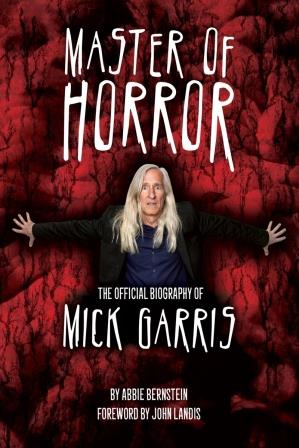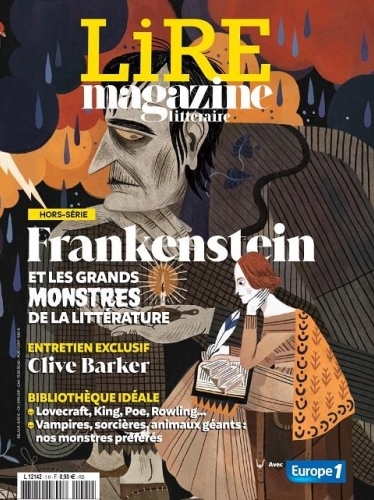Interviews 2021
Master Of Horror: The Official Biography Of Mick Garris
By Abbie Bernstein, Master Of Horror: The Official Biography Of Mick Garris, 2021
 [Re: The Mummy in 1990] "That was a particularly sweet memory for me, because he was in London, we were
working at his hotel. I would go to him, and we would talk through. He's such a gentleman, if I can use that
rather old-fashioned word, but he is. We knew we were doing something outrageous...
[Re: The Mummy in 1990] "That was a particularly sweet memory for me, because he was in London, we were
working at his hotel. I would go to him, and we would talk through. He's such a gentleman, if I can use that
rather old-fashioned word, but he is. We knew we were doing something outrageous...
"I didn't understand Hollywood at the time at all, and I certainly didn't understand that there were
areas of human endeavour that you couldn't really address. It never ocurred to me. The last thing I would have
done is waste Mick's time or mine on somthing that we weren't going to get made. That wouldn't have made any sense to
me. I'd been brought up in Liverpool seeing horror movies when they came around, without having any real
knowledge of how they were made or the constraints upon them. I hadn't dealt with the MPAA much, I hadn't
dealt with the American sensibilities that say, 'You're not going to talk about gender-bending in our culture.'
And you think about it now, some thirty and more years later - that still is an issue which doesn't come up in
a horror movie very often. If sexual ambiguity does, it tends to be on the rather camp side.
"Nobody was gender-bending in movies. In the case of The Mummy, it was a character who appears in the body of
the material as a woman, but actually is born as a boy. You never for a moment realise 'til you realise that
this gorgeous, glamorous woman who makes love to several men in the movie was [born as a] boy...
"A lesser imagination, a less courageous writer than Mick would have said, 'I'm not sure we should do this,' or
more likely, 'It wouldn't have a chance of getting made.' I've always had the feeling that if you do something
that could be made easily, you probably shouldn't be doing it. We both knew we were doing something challenging,
but he didn't at any point say, 'Should we do this? Is this good for our reputations?' He was just ready to
rock and roll. And I think that Mick, because he is such a gentleman, is sometimes misunderstood. People don't
value his imagination as much as they should. My experience in working with him is, he's ready to take on
board anything that anyone throws at him."
Clive Barker
By Fabrice Colin, Lire Magazine Littéraire, No. 1H, March / April 2021
 "My grandmother, Flo, had an appetite for the macabre and the horrific, the excessive, in the news – it had to be real otherwise
she wasn’t interested. She had a friend called Kitty and they both knew where the whiskey was... They would partake liberally
of this once Gran had finished her two Guinnesses for the day (which she warmed in front of the fire) and Kitty would come round
and off they’d go into brandy or whiskey – and tales would come out, and it didn’t matter that I was there. I’m sure they didn’t
wish to offend me and they certainly didn’t offend me, they intrigued me!
"My grandmother, Flo, had an appetite for the macabre and the horrific, the excessive, in the news – it had to be real otherwise
she wasn’t interested. She had a friend called Kitty and they both knew where the whiskey was... They would partake liberally
of this once Gran had finished her two Guinnesses for the day (which she warmed in front of the fire) and Kitty would come round
and off they’d go into brandy or whiskey – and tales would come out, and it didn’t matter that I was there. I’m sure they didn’t
wish to offend me and they certainly didn’t offend me, they intrigued me!
"I remember my grandmother telling me Joe Orton had died – I didn’t have a clue who Joe Orton was but I was interested when she
said ‘and he was found naked with his boyfriend’. Now Orton died in 1967, yes? So I was 14, and here’s my grandmother saying:
‘they were naked you know, and one of them had killed the other with a hammer!’ Now I had no context for any of this – the fact
that Joe Orton was a great playwright, which I believe he was, is, and Halliwell had killed him out of jealousy for his fame –
none of this was part of the narrative I was being told, or anything that I would have comprehended anyway.
"But it was just one of the things she said, as was the Candyman story: ‘Don’t go into toilets because there’s a man who’s around,
– all the time I hear about him, all the time – and he cuts the pee-pees off little boys.’ ‘Oh dear, grandma, I’ll be careful.’
She would never say anything like this in front of Mum or Dad – actually I don’t think she would say it in front of my brother Roy
either. But it was open season for me and I respected that immensely because it seeded things in me which continued to bear fruit
and flower.
"
Talking Of The Painting Of The Abarat
By Phil and Sarah Stokes, 27 March 2021 (note - full text here)
"I’ve been writing a lot about London because of these stories, and I think you can probably now talk about the fact that I’m doing these Theatre of Blood stories with Mick Garris. This is Clive Barker’s Theatre of Blood. It is ten new, utterly new, stories written in the tradition, if you will, of The Books of Blood, directly in that tradition. In other words, in my head even though we’re changing media I am thinking that these are ten more stories to become the seventh Book of Blood, if you will. And it was Mick’s idea to call it the Theatre of Blood, which I think is perfect."
Clive Barker Interview
By José Leitão and Ryan Danhauser, The Clive Barker Podcast, Episode 300, 11 April 2021
"For the Brits over there, I'm going to be flying over to make I think ten shows in England next year - and I'm telling you this on the
down-low; I shouldn't tell you anything more than that...
"I am [excited] too because it's the first time I've been back to Britain to make anything with British actors and British directors,
British cinematographers for a very very long time and the whole idea is that it's all British. And also really, really hard-core horror."
Episode 119: Clive Barker
By Mick Garris, Joe Russo, Post Mortem Podcast, 28 April 2021
"It’s a form of madness, but I’ve been [handwriting manuscripts] for so long I can’t imagine doing it any other way... It works for me, I guess
is the best way to put it, and it also attaches in my head to the process of drawing: I write I draw; I draw I write; it’s all interchangeable.
I very seldom create a story or a novel without having drawn the characters first, even if they’re very simple sketches; I need to know what it
all looks like... I need to know the geography of a house before I write about it... I draw, I make little maps, you know a top-view of a house,
so that I can locate, ‘OK, the stairs are there,’ you know. It matters to me only because – and this is something I’ve said before – I don’t
think of myself while I’m writing as a writer, I think of myself as a journalist, reporting on something I’m seeing... It’s happening in my mind’s
eye and so the best thing to do, for me at least, is not think about the words but think about the images and use the words to describe them...
"Taking yourself out of it works for me: taking my craftsmanship as somebody who is shaping, hopefully, an elegant sentence out of it and
simply describing with as much accuracy and economy and elegance as I can... As long as I get those qualities in the final draft, the first
draft and the second draft, which are setting down who’s going where and who’s killing who and how much blood there is, it doesn’t matter
whether I am present in that, whether I am thinking about the craft of it. What matters is that I am seeing in my mind’s eye something very
intense which my words are then describing."
Original Art Release
By Phil and Sarah Stokes, The Clive Barker Archive, 3 May 2021 (note - full text here)
"I’ve done a lot of designs recently for a number of projects; there are a lot of projects in the works now. There’s one which I am creating the stories for and I’m also creating the monsters for. I’m doing the same for Clive Barker’s Theatre of Blood with Mick Garris, in fact that’s part of what I’m bringing to them – I’m bringing the narrative and I’m bringing the monster, or monsters, plural. And so a lot of these drawings have that at the back of my head and it would be nice to get some new looks for monsters – and the only way I know to do that is to draw and draw and draw and draw until I find something new.”





